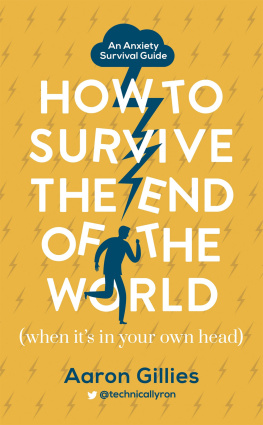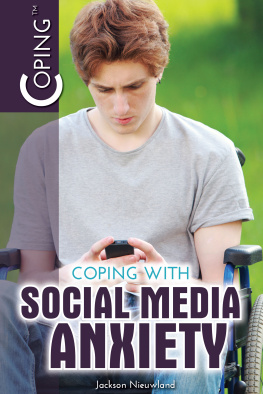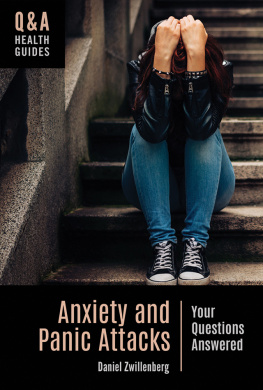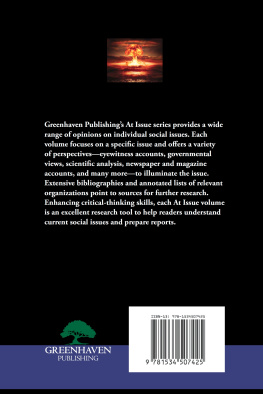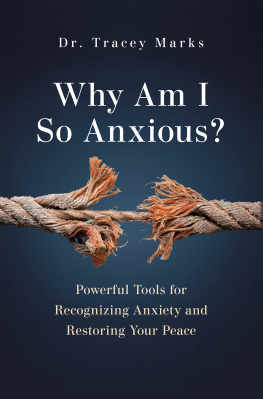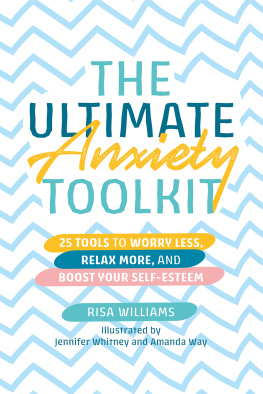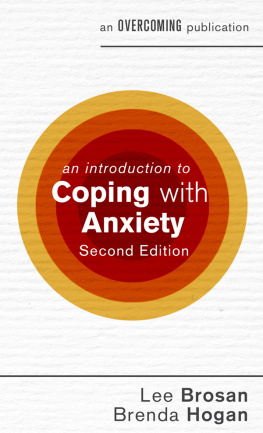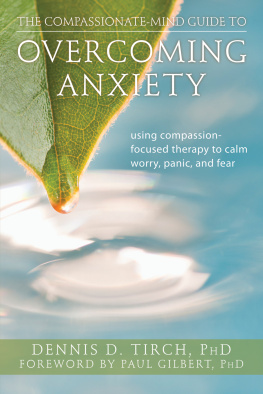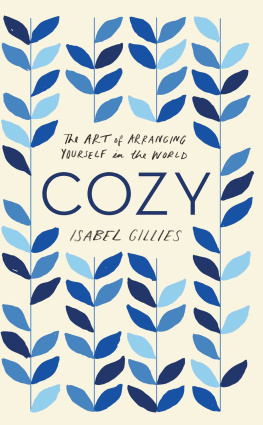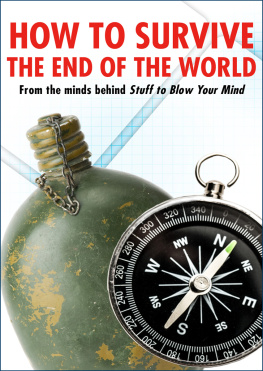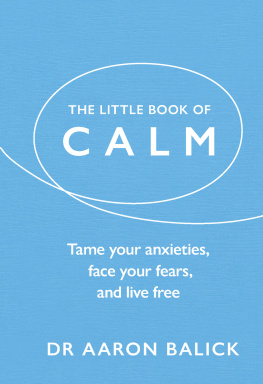ABOUT THE AUTHOR

Aaron Gillies, aka @TechnicallyRon on Twitter, is a comedian and writer. He has been featured in and written for The Poke , Buzzfeed , the Telegraph , the Guardian , the Huffington Post , amongst many others, and has produced viral tweets from Reasons my wife is crying to a short guide to washing machine symbols and a google autocompleted CV. Aaron has written about mental health for many years in various publications.
@technicallyron
technicallyron.com
ACKNOWLEDGEMENTS

This is the part where I thank people. The thing is, there are a lot of people to thank. I never thought I would be lucky enough to write a book, let alone a book about something so close to my heart, so please excuse me whilst I show my gratitude to some amazing people.
First, Id like to thank Kate, Lisa, Alice, Emma and the whole Two Roads team for taking a chance on me and publishing this bag of nonsense; your support has been nothing short of amazing. Thanks to my agent Becky, who should be given an award for having to put up with me. Another thanks to my wife Lex, who has to be married to a bananas person and without whom this book wouldnt be possible. To my parents, Sharon and Iain: without them, I wouldnt be the person I am today, and their support throughout everything has been so amazing that putting it into words would do it a disservice. To my brother and my best friend Cal, thank you for being you and being the rational voice I needed when I couldnt find that voice myself. To Mia, Daisy, Dean and Ruby, who all shared their stories with me for no reason but to try and help others, which is the most amazing trait you can ever wish for. To my in-laws, Dave and Anne, who brought me various amounts of coffee as I researched and scribbled this book on their porch in the south of France. To my friends, Andy, Tom, Paul and Roly, who have been a constant source of encouragement and frankly just been some of the finest humans alive.
And most importantly Id like to thank you, for reading this, because without you reading this, Im just a weirdo throwing words at pages by himself. The one thing that has helped me through my battles with various mental health issues is the knowledge that I am not alone in this, and I hope this book can make you feel the same.
1.
THE CLICHD INTRO
(AKA Me, Me, Me)

The human brain can do anything. It can compose symphonies, theorise on the vast absurdity of the cosmos, create artwork that can make grown humans cry. It can love, it can make connections with other human beings that can define your entire existence, it can relay experiences to others in prose and poetry. It can invent, innovate and pioneer. Its really quite incredible. But when I talk to my anxious brain about this, its less than reasonable:
Anxious brain: Lets have anxiety!
Me: But, but the other things?!
Anxious brain: You heard me.
You know that trope in movies where an angel and a devil appear on the protagonists shoulders? Now imagine that, but its just a boring, annoying, tiny version of yourself that appears on your shoulder to tell you everything that youre doing wrong with your life and revels in over-analysing everything you do. This version of yourself permanently rents the space on your shoulder and you cant evict it its claimed squatters rights, its a part of your day-to-day. And frankly, it is a massive fucking inconvenience.
But lets start somewhere that isnt bogged down in an overly laboured analogy. Lets start with the total bin fire that is my brain.
Im mad. I know you shouldnt use the word mad as an adjective to describe mental health disorders. It is, of course, a gross oversimplification and a term used flippantly by people who think random is a personality trait. But its easier to say to myself that Im mad than to say, I have several quite prevalent mental health disorders that manifest in many bizarre ways and I am dealing with them extremely poorly through medication, self-pity and an often crass use of deflective humour. Maybe lets not go with mad. Lets go with unique. Or bananas. Or straight up bonkers. Basically I need a word that differentiates the nonsense that happens in my own mind from what goes on in everyone elses. Im different. I am different to how I perceive everyone else in the world to be. I watch the other human beings, all of whom seem to have their shit together, doing their best in the world and I simply panic. I convince myself that I am losing my mind. My friends on Facebook post things about their marriages, their children, their brand new horse harpoons or whatever midlife-crisis shopping they are currently doing, and the closest I get to posting an interesting, life-affirming Facebook status is: I ate an entire share bag of crisps by myself today or I managed to hold a conversation with another person for almost two and a half minutes today and I only wanted to run away sixty-three times. With the benefit of having worked on my anxiety for years, I know this is just my brain over-analysing everything, I can have a tendency to judge myself by the achievements of others, when the truth here is that no one has their shit together. No one knows what they are doing; in every supposedly happy Facebook post there is realism, hidden behind a bad photo filter.
We are all winging it some of us are just better at convincing ourselves than others. At school they imply that by the time youre thirty youll have your entire life figured out. Youll have whatever fantastical job you dreamed about at the age of six, youll have a picturesque family with beautiful children, a dog called Ruffles or Barry or something, a herb garden, disposable income and a secret alcohol dependency. In reality, every person, or at least 90% of us, at any stage of our being on this planet, is screaming internally and wondering what the fuck is going to go wrong next. I know this, I can accept this, but I panic, I feel like I slip further down a rabbit hole of my own invention. This is just how my brain is wired. I cant take it back under warranty and ask for a new one, or take it to a Genius Bar and ask for a replacement part. The most I can do is try to understand why my brain programmed itself this way.
A BRIEF HISTORY OF MY BRAIN
Step one: Depression
Being a teenager is pretty much an awful experience for everyone. Your body hates you, so it makes everything as awkward as it possibly can just in case social hierarchies werent enough to worry about, now you have just one pube and a weirdly small testicle. Youre completely obsessed with social status, education and expectation. Which means that any form of self-care can fall by the wayside. In retrospect I was depressed long before I was diagnosed but I didnt know what depression was when I was a teen. Depression was something my music heroes had, it wasnt for people who worked in petrol stations: you felt bad, you got on with it. Well thats what I thought, but what I didnt know was that if you hide something inside yourself for long enough, you break.
I was twenty-two when I first convinced myself to see a therapist. The first question they asked was, How was your childhood? It had taken me four years to get to the stage where I thought I could handle therapy. It was the fourth time I had been referred by my doctor and every other time I had ignored it, or made excuses about how therapy wasnt for me. A master in the art of procrastination, I treated my mental illness like a sprained ankle. Ignorance was indeed bliss in this case. If I ignore it, it will just fix itself/These things sort themselves out, dont they? SPOILER ALERT: these things do not sort themselves out. In fact it takes a lot of hard work and perseverance to start to understand your own brain.

